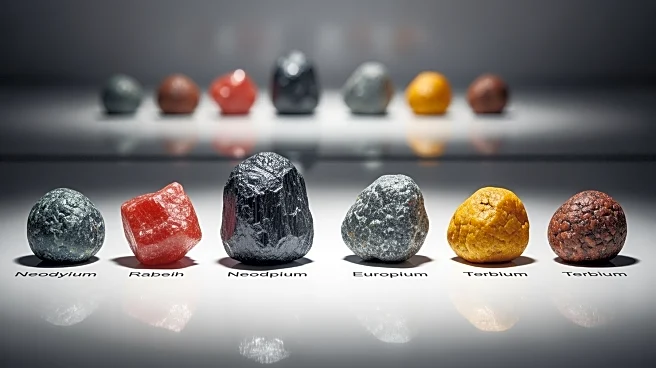What's Happening?
China is reportedly developing a plan to restrict shipments of rare earth magnets to US military contractors, while easing restrictions for US companies producing consumer electronics. This move is part
of China's strategy to leverage its dominance in rare earth metals, which are essential for manufacturing military hardware such as F-35 fighter jets. The plan involves a 'validated end-user' system to expedite shipments for approved civilian firms in the US, allowing China to fulfill its promise to President Trump to ease exports while excluding military contractors. China controls approximately 70% of global rare earth mining and 90% of processing capabilities, and has been gradually limiting access amid rising tensions with the West.
Why It's Important?
The restriction on rare earth shipments to US military contractors could significantly impact the US defense industry, which relies on these materials for advanced military technology. This development underscores the strategic importance of rare earths and highlights the vulnerabilities in the US supply chain. The move may compel the US to accelerate efforts to secure alternative sources of rare earths, potentially affecting global trade dynamics and geopolitical relations. Companies with dual-use products, serving both civilian and military markets, may face operational challenges, affecting their business strategies and profitability.
What's Next?
The US may need to intensify its search for alternative rare earth sources, both domestically and internationally, to mitigate the impact of China's restrictions. This could involve increased investments in mining operations in countries like Kazakhstan, Greenland, and Ukraine, as previously indicated by President Trump. The situation may also prompt diplomatic negotiations to address trade tensions and ensure a stable supply of critical materials. US companies affected by the restrictions will likely seek clarity on eligibility for general licenses to continue receiving rare earth shipments.
Beyond the Headlines
The restriction on rare earth shipments highlights the broader geopolitical struggle between the US and China, with implications for global trade policies and international relations. The reliance on a single country for critical materials poses ethical and strategic questions about supply chain resilience and national security. This situation may drive innovation in material science and recycling technologies to reduce dependency on rare earths.









